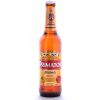Primátor A.S. - Maibock
-
ABV:
7.5% -
Serving Temperature:
45-50° F -
Suggested Glassware:
Pint Glass or Mug
“What’s a maibock?” you ask. Also commonly known as a Helles Bock, it’s a variant of bock that’s lighter in color and generally a bit more assertive in the hop department. On the pour, Primátor Maibock presents a rich golden color with a sizeable off-white head that leaves some foam clinging to the glass as you drain it. We found the malty aromas to be pretty big on this one while the hop aromas took a bit of a back seat; expect a prominent expression of buttery caramel and toasted biscuits, with maybe a hint of hay and a touch of dusty lager yeast. Look for the malty aromas to come through on the palate too, as caramelly, honeyish, malts make up the core of this brew. We also noticed a vague fruity character, which we often find associated with Munich and/or Vienna malts. From an American perspective, hop bitterness is far from strong, but it is more present than in most standard bocks. At 7.5% ABV it’s fairly strong for the style, and a note of alcohol does come forth to augment the hops as they balance the malt with a signature spicy, herbal Bohemian Saaz hop quality. Named World’s Best Lager by the World Beer Awards in 2008, this is a bold, beefy maibock that will hold up to Kobe steak strips or even a London Broil. Na zdraví!
These Bohemian beers we’re featuring this month are the work of artisanal Czech brewers who hold an appreciation of beer not like many others. After Czechoslovakia split up in 1993, the Czech Republic (a land area just a bit smaller than South Carolina) achieved a significant distinction in the beer world: number 1 in beer consumption per capita. (Apparently wine is more popular among many Slovaks, who brought the per capita average down prior to the split. Those darn Slovaks!) Indeed, the conclusion from a study conducted by the German Brewers Association in 1998 showed the Czechs were not just at the top of the rankings; they were on top by a lot. Per capita, the Czechs drink around 334 US pints every year – about one beer daily for every man, woman, and child. Considering most of the kids are probably not tossin’ back a whole lot of those beers, that’s a huge amount for the adults!
The popularity of beer in this region of the world goes back a long way. The agricultural conditions are perfect for hop farming, and their growth in Bohemia is documented as far back as the year 859. These Bohemian hops were sent down the Elbe River for export to Germany in 1101, where they were sold in the hops market in Hamburg. Bohemian Saaz hops are still coveted to this day (perhaps more so in recent years as the recent worldwide hop shortage hit Saaz hops particularly hard).
Accounts of home brewing in the Czech region are chronicled as early as 1088, with the first Czech brewery opening in 1118, in the town of Cerhenice. In terms of longest-running breweries, Prague’s U Fleku microbrewery has been making beer since 1499 – just seven years after Columbus discovered the New World! Our featured beers this month come from Primátor A.S., a brewery founded as recently as 1871 (which makes it relatively “young” in terms of old-world breweries). Located in the small town of Náchod, they used to go by the name Pivovar Náchod (pivovar is the Czech word for brewery), until recently changing their name to match their famed beer brand. This is a fairly common occurrence as the industry evolves over time; in the past, brewers were often more associated with their local regional markets than with a brand name. In modern times, as transportation has become easier, many breweries have supplanted their local brewery name with a more recognizable brand.
Building a brewery can take time, especially in the 19th century, so it was about two years after the brewery was founded that the first beer flowed to the local townspeople. Over the next 50 years, their beer gained popularity steadily, and the brewery was enlarged between 1925 and 1930. Unfortunately, after the German invasion of March 15th 1939, many Czech citizens found themselves conscripted to labor in steel mills, coal mines, and munitions factories. As production of consumer goods was curtailed in favor of German military production, eventually culminating in the prohibition of all non-war-related industry, the brewery’s (and the whole brewing industry’s) development was delayed until after the war.
Unfortunately, with Czechoslovakia under Communist control, very little capital or ingenuity was invested into the nation’s breweries. The good news, however, was that beer was pretty cheap (even if largely lackluster). This fact was crucial in establishing beer consumption as arguably the most popular hobby for Czech men. One of the country’s most famous beer drinkers, the protagonist in Jaroslav Hasek’s 1923 satire “The Good Soldier Svejk,” stated that a government that increases the price of beer would fall within one year. Well, the Communist government raised the price of beer by almost 100% in 1984, and though it took five years until the Velvet Revolution, the Good Soldier’s forecast came true. Currently, Czech beers are in high demand worldwide, and they command top dollar from the various countries to which they’re exported – which has had the effect of keeping prices low for the locals. Though the brewing business may change over time, it’s the passion of traditional brewers like the good folks at Primátor that ensures great beer remains a staple in the Czech Republic, and increasingly, here in America too. Cheers to them!

Unmatched Variety by style, brewery & country
Choose from Five different Beer Clubs offering unmatched variety by brewery,
country of origin, and beer style to suit your specific tastes.


